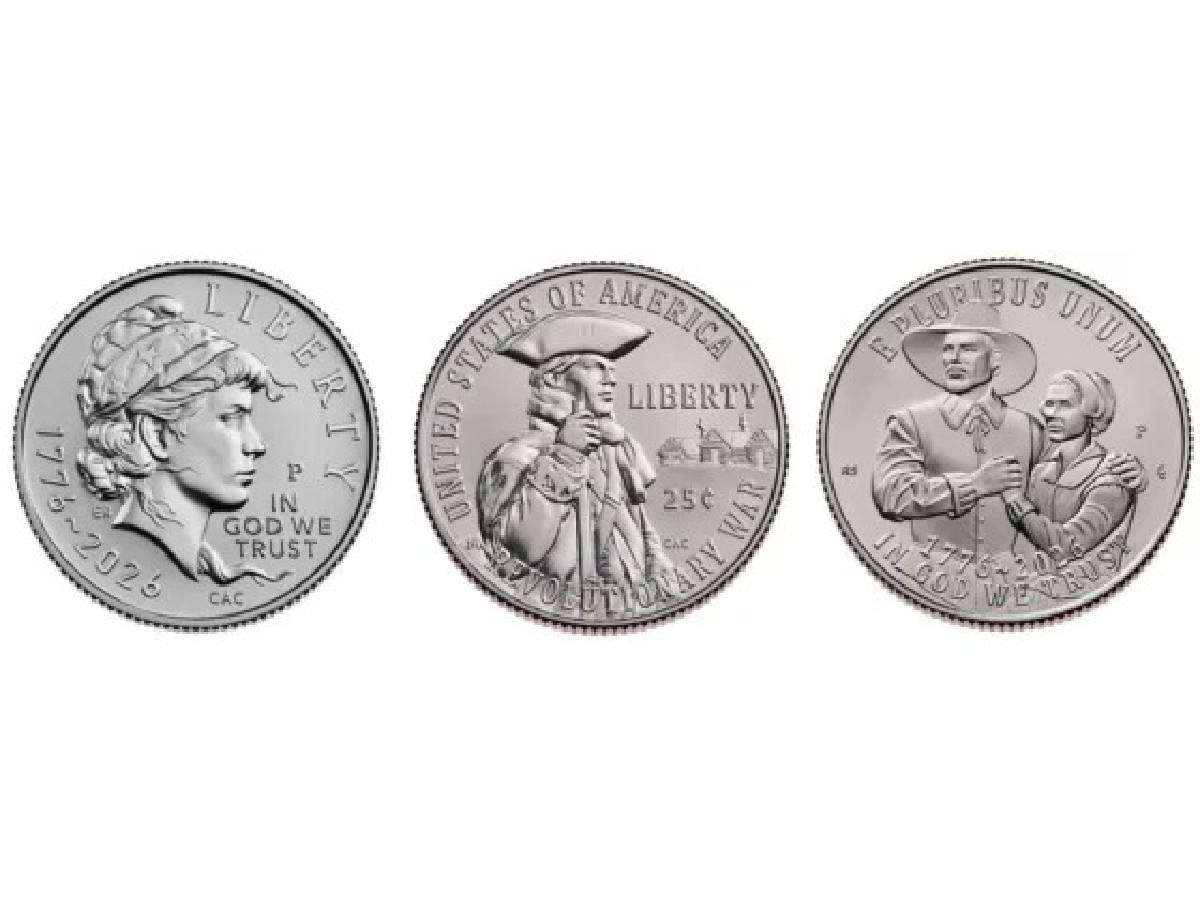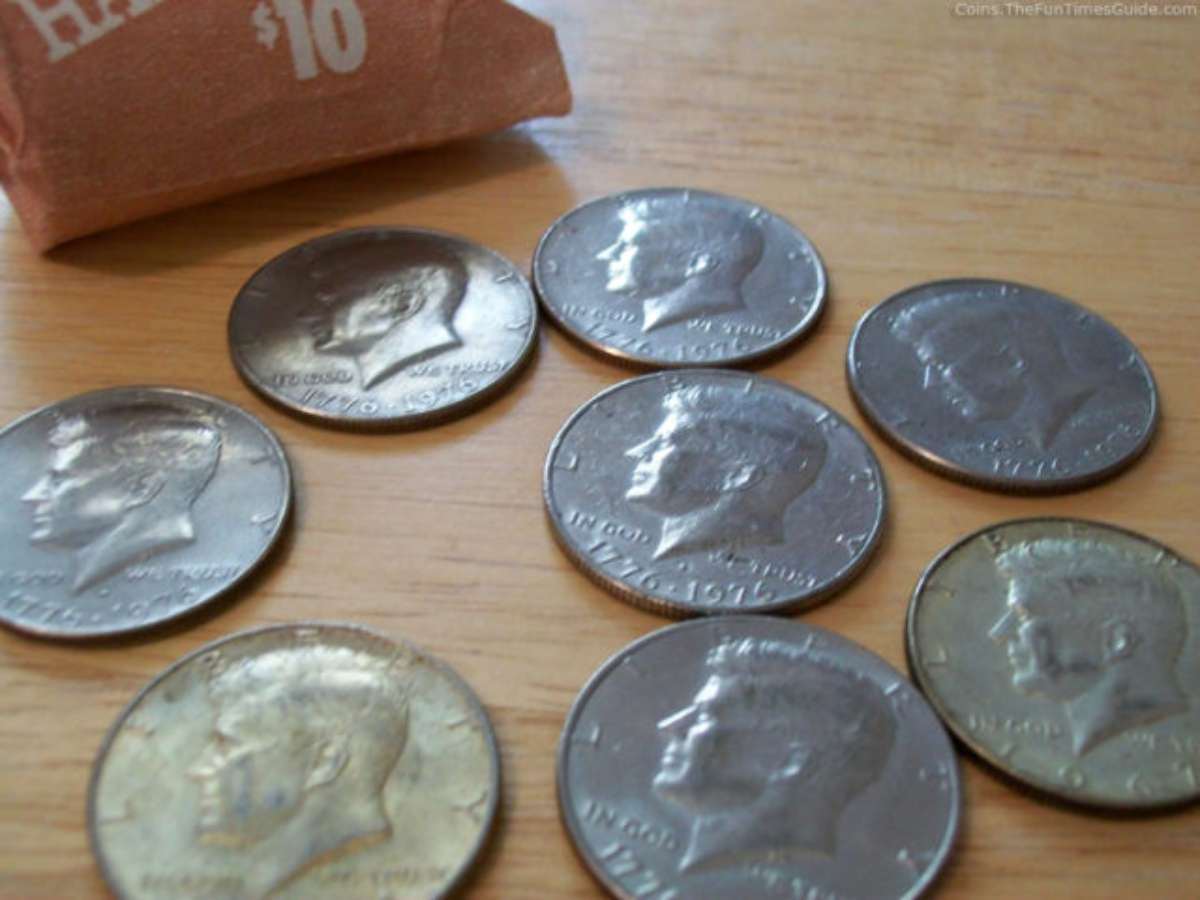
As a coin collector, I like to buy rolls of coins and see what I can find within — it’s called coin roll hunting.
Recently, I went to the bank and decided to spend $20 on rolled coins.
I ended up buying:
- 5 rolls of nickels (a total of 200 nickels) for $10
- 1 roll of half-dollars (20 half-dollars) for $10
I knew I had coin roll hunting success on my hands when, on my way out of the bank, I peeked under the end of the paper half-dollar roll and saw the distinctive whitish color of a silver half-dollar underneath.
Yep, 50 cents bought me a 1964 90% silver half-dollar worth $5 to $7!!!
In this article you will find:
- Some of the valuable coins I’ve obtained for face value — simply by buying bank rolls.
- A list of coins you should be looking for in bank rolls, by denomination.
- Tips for looking through coin rolls yourself — when you’re attempting to find valuable coins.
Okay, let’s get started.
How to determine the grade of your coins yourself… and the best coin grading apps to assist you with the task.
Look For These Inside Rolls Of Dollar Coins…
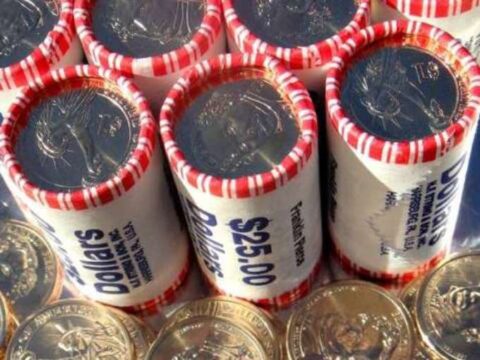
While you can’t get rolls of silver dollars at your bank anymore, you can still get rolls of Sacagawea golden dollar coins, if you call the bank ahead of time.
They will have your roll(s) of dollar coins waiting for you when you arrive at a cost of $25 per roll (with 25 U.S. dollar coins inside).
Uncirculated Sacagawea dollar coins are worth $1.50 to $2 apiece — so finding one (or more) would be a pretty big win, at no cost to you!
I’ve found many early Sacagawea dollars this way — including the 2000-P dollar coins and 2000-D dollar coins. While they’re not valuable yet (currently worth only face value)… there’s a good chance these dollar coins could go up in value. They’re also great for completing your coin collections by year.
The same goes for Presidential $1 coins, which I’ve found many of in dollar rolls. Again, these generally aren’t valuable coins (yet), but I’ve been able to build entire collections of Sacagawea dollars and Presidential $1 coins simply by searching through bank rolls!
You might happen upon some cool plain edge Presidential $1 coins (or godless dollars) in bank rolls. Plain-edge dollar errors are unusual because they don’t have any lettering on the edge of the coin. (The typical Presidential $1 coin is supposed to have edge lettering.)
If you find a plain-edge Presidential dollar when you’re coin roll hunting, then you’ll have a coin that’s worth about $25 to $50. These scarce error coins are out there… so keep looking!
Of course, you should also know how to spot a fake plain edge Presidential $1 coin from a legit one that is truly an error.
Here’s how to determine the condition or grade of your U.S. silver dollar coins.
Look For These Coins Inside Rolls Of Half Dollars…
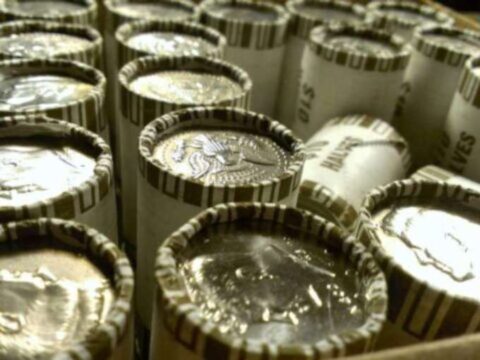
Some of the most valuable coins that have ever been made are U.S. half dollars!
I remember one of the first times I ever began looking for silver half dollars while coin roll hunting.
I bought a single roll of half-dollars from my local bank and dashed home. When I got home, I opened up my rolls of coins to see what I had obtained.
Here’s what I found in that one half-dollar roll:
- One 1964 90% silver Kennedy half-dollar in About Uncirculated condition — $5 to $7
- One 1967 40% silver Kennedy half-dollar in Extremely Fine condition — $2.50
- Six 1776-1976 Bicentennial half-dollars in Extremely Fine-About Uncirculated condition — $3 in total (or face value)
Not bad for a $10 roll of half-dollars from the bank, huh?!
Two of the half-dollars alone (the 1964 and 1967) are worth about as much as the face value of the entire roll — thanks to the bullion value of the silver that those two half dollar coins contain!
Here’s a video I made showing the notable half-dollars that I found in that bank roll:
You should also be looking for these half dollars in bank rolls:
- Any Walking Liberty half dollars – $6 to $8+
- Any Franklin half dollars – $6 to $8+
- 1974 doubled die obverse Kennedy half dollars – $20+
- 1982 no-FG Kennedy half dollars – $25+
Here’s how to determine the condition or grade of your U.S. half dollars.
Look For These Coins Inside Rolls Of Quarters…
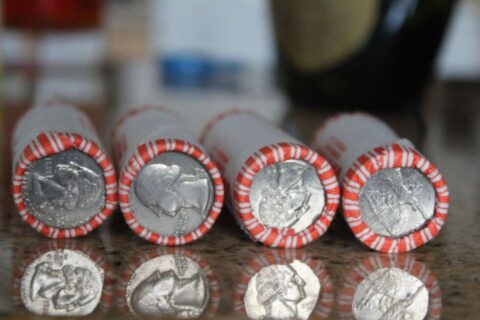
I’ve found some really cool quarters while digging through bank rolls!
Once I even picked up a 1964 silver Washington quarter worth about $3.50!
Some of the best finds you can make today include 90% silver Washington quarters — which take a huge amount of effort to find, but they still turn up once every few thousand coins or so.
Aside from silver quarters, I’ve found quite a few valuable clad quarters in bank rolls as well.
Clad Washington quarters you should be looking for:
- 1982-P quarter – 35 cents to $2+
- 1982-D quarter – 35 cents to $2+
- 1983-P quarter – $1 to $5+
- 1983-D quarter – 35 cents to $2+
- 2004-D Wisconsin Extra Leaf quarter error – $50+
- 2005-P Minnesota Extra Tree quarter error – $50+
- 2005–D Minnesota Extra Tree quarter error – $50+
Here’s how to determine the condition or grade of your U.S. quarters.
Look For These Coins Inside Rolls Of Dimes…
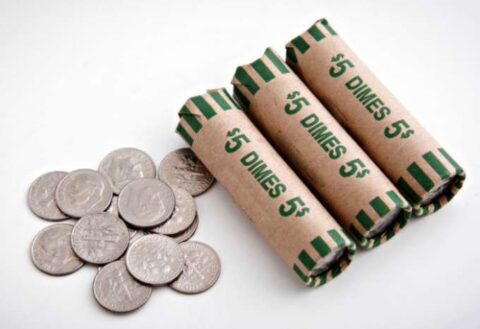
It seems some people forget about the dime as a collectible.
The nation’s smallest currently circulating coin (in terms of its physical size), the United States 10-cent piece offers collectors many opportunities for exciting finds… if you know what to look for!
It’s possible that you may find 90% silver dimes in bank rolls. But you’re not likely to find too many silver dimes unless you’re looking through hundreds of dime rolls.
I’ve had a particularly hard time finding silver dimes in rolls. In fact, I’ve had no such luck yet through coin roll hunting. (Though I’ve found one or two in my pocket change… go figure!) My best dime roll finds are older clad Roosevelt dimes in what appear to be uncirculated condition.
By the way, low-end uncirculated clad Roosevelt dimes are worth maybe twice their face value (or roughly 20 to 25 cents apiece). But they’re still neat finds, compared to the ordinary well-worn clad dimes that usually turn up in loose change.
Other clad Roosevelt dimes you should be looking for:
- 1965 off-metal, silver Roosevelt dime error – $4,000+
- 1982 no-P dime – $50+
- 1996-W dime – $3+
Here’s how to determine the condition or grade of your U.S. dimes.
Look For These Coins Inside Rolls Of Nickels…
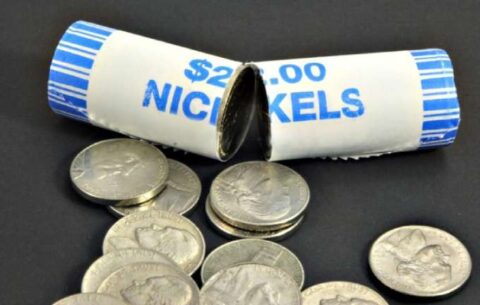
Some of my nickel rolls from the bank have also contained a few nice finds.
It depends what you’re looking for when it comes to deciding how many “nice” coins are in a bank roll of nickels.
Personally, I tend to look for any nickels made before 1960 (and foreign nickels).
One time, I found these when I bought 5 bank rolls of nickels:
- ONE 1946 Jefferson nickel – 10 to 25 cents
- ONE 1959 Jefferson nickel – 10 to 20 cents
- TWO 1959-D Jefferson nickels (one is a very, very lustrous About Uncirculated) – 10 to 20 cents apiece
- ONE 1993 Canadian nickel – 10 cents
However, if you were searching for pre-1965 nickels, then I found these treasures in the same nickel rolls:
- 5 to 10 1960 to 1964 Jefferson nickels – 7 to 10 cents apiece
I also found several Westward Journey nickels that many people like to collect.
This video shows the neat finds I made in the 5 nickel rolls mentioned above:
While these nickels may not be the most valuable modern coins available, they do make terrific circulation / coin roll hunting discoveries!
Other U.S. nickels you should be looking for in bank rolls:
- Buffalo nickels – $1+
- Silver wartime nickels (from 1942 to 1945) – $1
- Nickels with repunched mintmarks – $20 to $50+
- Doubled die nickels (such as the 1943-P doubled eye nickel) – $20 to $50+
Here’s how to determine the condition or grade of your U.S. nickels.
Look For These Coins Inside Rolls Of Pennies…
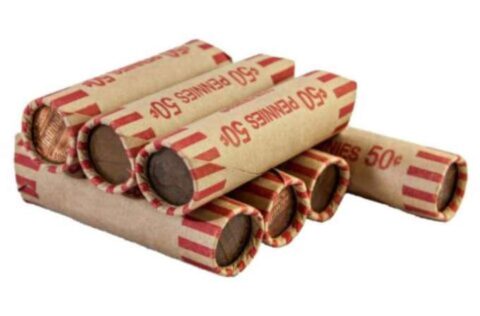
I’ve found so many old and unusual pennies in penny rolls while coin roll hunting.
From old wheat cents to pennies with errors to foreign coins and more…
I think my favorite bank rolls to search through are penny rolls — because they’re so cheap (just 50 cents each).
I always look for (and have often found) these in penny rolls:
- Wheat pennies (1909 through 1958) – 3 cents to 10+ cents
- Copper-based Lincoln Memorial pennies (1959 through 1981) – 2+ cents
- Canadian pennies – 1 to 5+ cents
None of those coins is particularly valuable. The oldest Lincoln wheat penny I’ve ever found in a bank roll was from 1918 — but at least 1918 pennies are worth 10 to 20 cents, which is significantly more than face value!
I haven’t found any of these yet, but my favorite pennies to look for in bank rolls are:
- 1969-S doubled die penny – $70,000+
- 1972 doubled die penny – $250+
- 1982-D copper Small Date Lincoln penny – $15,000+
- Bronze 1982 pennies (which weigh about 3.11 grams) – 2+ cents
- 1983-D copper Lincoln penny – $12,500+
- 1983 doubled die penny – $200+
- 1984 doubled die penny – $100+
- 1989-D copper Lincoln penny – $3,000+
- 1992 Close AM penny – $20,000+
- 1992-D Close AM penny – $2,500+
- 1995 doubled die penny – $20+
Need a coin scale?… This is my favorite scale for weighing coins. You should also have a coin price guide — to help you determine the value of all the coins you find.
My Best Coin Roll Hunting Tips
Finding old and rare coins — such as Indian Head pennies and 90% silver dimes — may be possible while searching through old coin rolls, but it isn’t necessarily easy to make those discoveries.
One thing that will tip the odds in your favor when getting coin rolls from a bank is to ask the bank teller if they’ve recently seen older-looking rolls of coins come into the bank. If so, buy any that they happen to have on hand!
Improve your odds of finding old and rare coins in coin rolls:
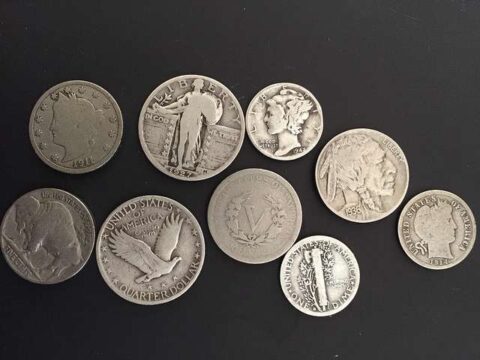
- Half dollar rolls and penny rolls tend to yield the highest number of “keepers” per roll. (I’ve found a wheat cent at least once every 2 or 3 penny rolls I’ve searched, and 40% or 90% silver Kennedy half dollars tend to appear in every 1 or 2 rolls, too.)
- Silver dimes or silver quarters are easiest to spot by checking the rims — so you can see at a glance which are silver and which are copper nickel. (The 90% silver coins don’t have the orange or brown line along the coin edge as seen on copper-nickel coins.)
- Errors and varieties can be difficult to spot at first. My advice is to set aside all coins from a certain date that are widely known for their errors — such as “1972 cents” (there was a rare doubled die made that year) or “1982 Kennedy half dollars” (some are missing the FG initials to the right of the eagle’s tail) — so you can more thoroughly look for the presence of errors on those coins when you have more time.
The Bottom Line
There are many, many amazing coins hiding in bank rolls… all you need to do is look for them. And it won’t cost you more than the face value of the coin rolls to do it!
The coins I’ve mentioned above are to give you just a taste of the many great coins you can find when you’re coin roll searching — if you look hard enough.
Who knows what you’ll find when you buy rolls of coins from your bank. Perhaps you’ll be lucky enough to find some of the fascinating coins that I and other collectors have discovered in bank rolls.
Be careful though… coin roll hunting can be addicting!
Here’s a list of U.S. coins worth more than face value by denomination.
Do Bank Rolls Contain Only Circulated Coins Or Only Uncirculated Coins In Them?
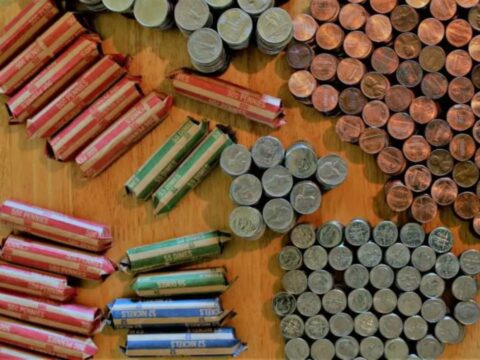
A friend recently asked me this, and it’s a great question that I thought I’d address here.
Actually, there’s no rule of thumb for the type of coins you’ll find in bank rolls.
I’d say about four-fifths of the bank rolls I’ve received were circulated coins, while the others were uncirculated coins.
- Oddly enough, the pennies seem to be the coins that I most find often coming in totally uncirculated rolls. (This, of course is disappointing if you’re looking for old pennies.)
- The half dollars are virtually all circulated — except for the many virtually unused halves that turn up in those mixed, otherwise circulated rolls.
- Dollar coin rolls tend to contain mostly older (pre-2012) uncirculated coins.
- Bank rolls for all the rest of the coins (nickels, dimes, and quarters) typically contain circulated coins, in my experience.
So to paraphrase Forrest Gump… When it comes to the coins in bank rolls, “You never know what you’re gonna get!”
Plan Ahead Before You Buy Coin Rolls
If you are planning to buy rolls of coins from a bank, I would encourage you to know how much you’d like to spend before you get there.
These are the face values of different bank rolls:
- Dollars – 25 coins, $25
- Half dollars – 20 coins, $10
- Quarters – 40 coins, $10
- Dimes – 50 coins, $5
- Nickels – 40 coins, $2
- Pennies – 50 coins, 50 cents
Our Other Coin Roll Hunting Resources:
What valuable coins have YOU found in bank rolls? Let us know in the comments below.
I’m happy to answer any questions you might have about coin roll hunting!


